CHHSM Synod Resolution on Racism is the Latest in its Tradition of Public Health Advocacy
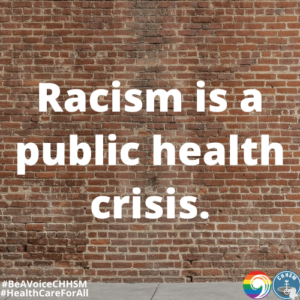
This summer, the Council for Health and Human Service Ministries (CHHSM) and Council on Racial and Ethnic Ministries (COREM) are bringing a Resolution of Witness to the 33rd General Synod of the United Church of Christ, calling on the church to declare and respond to racism as a public health crisis. The resolution calls the national setting to develop ways to raise the UCC’s consciousness of racism as a public health crisis from theological, bioethical, and public health perspectives. It also encourages work in public policy towards health equity, and helping local congregations and ministries address racism as a public health crisis.
The resolution is important in helping the UCC and CHHSM — on behalf of its member ministries — find strategies for dismantling racism and fortifying health equity in public health systems. In part, the resolution grew out of CHHSM’s Board and staff releasing a statement on the pandemic of systemic racism in June 2020.
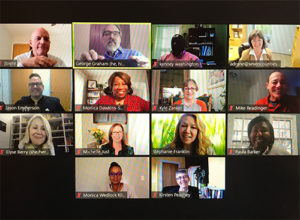
CHHSM’s 72 UCC-related corporate members operate more than 400 communities and programs for children, youth, families, older adults and people with disabilities. Its ministries range from small care centers to large hospital networks, but are bound together by a call to serve others in faith. The systemic racism statement and co-sponsorship of the resolution are the latest in a tradition of CHHSM and its member ministries not only serving but advocating for their clients, residents, and communities.
“The mission of CHHSM is advancing the work of UCC-related health and human service ministries to create a more just, caring and compassionate world,” said the Rev. George R. Graham, CHHSM vice president. “Advocacy is a prime piece of that. We can’t fulfill our mission or achieve our vision without advocating for health equity and the dismantling of systemic racism.”
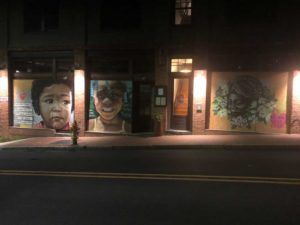
To that end, CHHSM recently developed Advocacy and Anti-Racism Centers on its website. The Advocacy Center includes toolkits and other faith-based advocacy resources. The Anti-Racism Center provides a collection of resources and ways to engage in racial justice. Both centers contain a wealth of information and links to help UCC members and CHHSM ministries acquire better tools in becoming serving leader advocates.
CHHSM’s work to draw attention to the public health aspect of many societal ills is a long-standing tradition. Its member ministries have advocated for immigrant children, met with Congressional representatives to advocate for affordable housing, petitioned city councils, and partnered with other nonprofits in their communities in advocacy and service efforts. The current Resolution of Witness declaring racism a public health crisis is the latest in a string of CHHSM-sponsored Synod resolutions examining key issues through a public health lens — all of which have passed by overwhelming majority of delegates.
“This liberatory work [of advocacy] for the City of God is generational, ancestral, and daily,” said the Rev. Dr. Elyse Berry, CHHSM association for advocacy and leadership development. “General Synod resolutions invite us as church into a space to listen and respond to how God is speaking in that moment, but they should also call us to accountability and guidance for lives of right-relationship thereafter as well.”
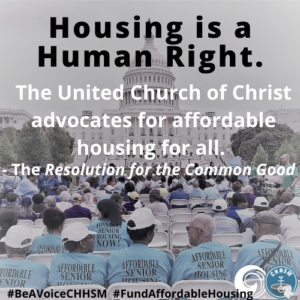
In 2013, CHHSM submitted its first Resolution of Witness to the General Synod, advocating for funding to construct quality affordable housing. The resolution called for the restoration of ongoing and robust funding for new construction of quality affordable housing, specifically under HUD Section 202 and Section 811 programs, and the continuation of the low-income housing tax credit program. It called the church’s attention to the statistics of the time: a gap of 5.5 million units of quality, affordable housing for families, and the increasing tragedy of homelessness among low-income older adults; and the increase in the older adult population, which will double by 2030.
When in 2017 it became increasingly apparent that gun violence was reaching epidemic proportions, CHHSM introduced a resolution to the UCC General Synod recognizing and studying gun violence as a public health emergency. Siding with the 2016 American Medical Association position that the country was facing a public health crisis from gun violence, the resolution called on the Congress to allocate federal funding for the scientific research of gun violence by the CDC and National Institutes of Health.

At the 2017 Synod, when the resolution was presented to delegates, CHHSM President and CEO Michael J. Readinger said, “Most of our 400 ministries across the country deal directly with the effects of gun violence, both in the communities they serve and with the staff who do that work. By allowing the scientific community to do research on the public health effects of gun violence, we can begin to better understand how to change the tide of devastation caused by the ever-increasing gun violence in our country.”
Delegates to that Synod also heard heartfelt pleas from youth attending the event, who related personal experiences with gun violence.
CHHSM also sponsored a resolution in 2019 recognizing opioid addiction as a health epidemic. Passing with 97 percent of delegate votes, the resolution was two-pronged: recognizing opioid addiction as a health epidemic, increasing access to treatment, and urging Congress to increase Medicare and Medicaid funding to treat opioid addiction; but also using shareholder activism of opioid pharmaceutical manufacturers and distributors to hold accountable those who irresponsibly market, distribute or prescribe opioids, or criminalize those who become addicted.
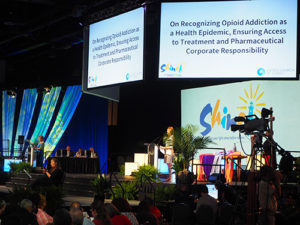
“When something this catastrophic impacts our communities, it is the responsibility of organizations like CHHSM to take action,” said Readinger at the time. “This resolution … will be brought to life in every way that it is lived into by individuals, local churches, regional associations and conferences, and the national setting of the UCC.”
The cumulative effect of all the work in public health advocacy has increased awareness by CHHSM Board, staff and member ministries of the overarching effect of systemic racism in today’s world. The issues brought to light through past resolutions are connected to the current pandemic of systemic racism.
Says Berry, “The pertinent issues CHHSM has raised in our resolutions — on gun violence, affordable housing, substance use, and racism as public health crises — are not only still with us, but they are interconnected. They have something prophetic to say about the roots of injustice and how we as people of faith can respond to them with the life force of the resurrection behind us.”
Read the text of the 2021 Resolution of Witness declaring and responding to racism as a public health crisis.
Learn the background behind the current resolution on racism as a public health crisis.
Access CHHSM’s Advocacy Center and Anti-Racism Center.
Read about the 2017 resolution on gun violence.
Read about the 2019 resolution on the opioid crisis.
Join Our Mailing LIst
"*" indicates required fields
Follow on Facebook
Pension Boards appoints David A. Klassen as its President, CEO - United Church of Christ
www.ucc.org
The Pension Boards, an affiliated ministry of the United Church of Christ recently announced its appointment of David A. Klassen as its next President and